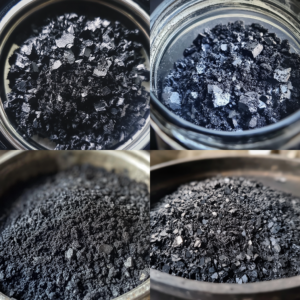I’ve spent a good part of my career working with calcined petroleum coke (CPC), and let me tell you—it’s crucial. If you’ve ever wondered why it’s such a big deal in industries like aluminum and steel, you’re not alone. I used to ask myself the same question.
- Calcined petroleum coke is a carbon-rich material made by heating petroleum coke to high temperatures. It’s essential for making things like aluminum and steel, and it’s what makes these industries tick.
But here’s the thing—there’s a lot more to CPC than just its basic uses. Trust me, once you dig a little deeper, you’ll see just how important this material really is. Stick with me as we dive into the nuts and bolts of it.
How Is Calcined Petroleum Coke Made?
I remember the first time I saw calcined petroleum coke being produced. It felt like watching magic happen. But there’s no wizardry involved—just heat, heat, and more heat.
- The process of making CPC is surprisingly simple. You heat petroleum coke at really high temperatures, remove volatile elements, and what you get is a material that’s perfect for industries like aluminum and steel.
Let’s break it down a little more. Imagine the intense heat—over 1,300°C—just to get rid of sulfur, nitrogen, and other impurities. It's these elements that can mess with the quality of the final product. In the CPC production process, you’re essentially purifying carbon at a molecular level. Here’s how it works:
| Process Stage | Temperature (°C) | Key Change |
|---|---|---|
| Heating of Petroleum Coke | 1,300-1,400 | Removal of volatile substances |
| Calcination Complete | Above 1,400 | Formation of high-purity carbon |
What Are the Main Applications of Calcined Petroleum Coke?
CPC isn’t just a material that sits in a factory—it has real-world impact. In aluminum and steel production, it plays a starring role.
- You’ll find calcined petroleum coke in everything from aluminum anodes to electric arc furnaces in steel production. Without it, the production of high-quality metal would be nearly impossible.
Here’s where it gets interesting. In aluminum, CPC helps create anodes that allow the metal to be extracted from ore. For steel, it provides the carbon necessary for smelting. Without it, steel would be of a lower quality. Think about it: No CPC, no aluminum as we know it. No CPC, no high-grade steel. It's that important.
What Are the Specifications of Calcined Petroleum Coke?
When I talk to people about CPC, they always ask about the specs. And I get it—knowing the numbers is essential if you want to find the right supplier.
-CPC is defined by its carbon content, sulfur, and ash levels. These specs are what make or break its performance in industrial applications, especially when it comes to producing high-quality metal.
Let’s talk about what really matters here: Carbon content. The higher the carbon, the better the performance. Why? Because in industries like steel and aluminum, impurities can affect efficiency and product quality. High carbon content is a must. Here's a simple breakdown of the key specifications:
| Specification | Value | Significance |
|---|---|---|
| Carbon Content | ≥ 98% | Ensures high purity for industrial use |
| Sulfur Content | ≤ 0.5% | Reduces negative reactions in manufacturing |
| Ash Content | ≤ 0.5% | Purity ensures better operational efficiency |
How to Choose the Right CPC Supplier?
Let me share something from my own experience: Choosing the right supplier is everything. It’s not just about price—it’s about reliability.
- When choosing a calcined petroleum coke supplier, consistency is key. Look for a supplier who meets your quality needs and delivers on time.
I’ve had my fair share of dealings with suppliers. Some were great, others—well, not so much. What I’ve learned is that you need to find a partner who can give you consistency and reliability. Here’s a quick checklist:
- Certifications: Proof that the CPC meets your quality standards.
- Production Capacity: Can they handle your volume needs?
- Reliability: A supplier who can deliver consistently, on time, and according to spec.
Why Choose Us for Your CPC Needs?
You might be wondering—why us? Well, at Ali-Carbon, we’ve been in the CPC business for over 10 years. We’re all about high-quality, consistent products that deliver real results. Our CPC is rigorously tested to meet the highest standards. If you want reliable, high-quality CPC, we’ve got you covered.
Conclusion
To wrap it up, calcined petroleum coke is more than just a raw material. It’s the backbone of key industries, and choosing the right supplier is essential for success.
Call to Action
Ready to get started with high-quality calcined petroleum coke? Reach out to us at [email protected] or connect on WhatsApp: +86 18202528603 click here.


